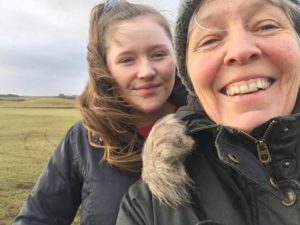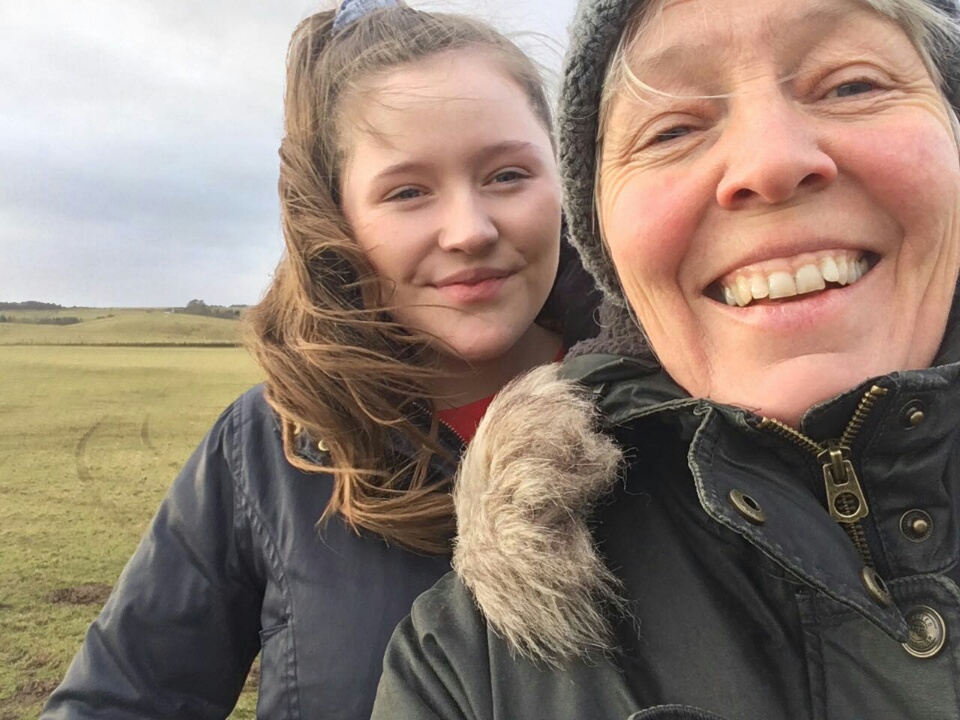Integrated Land Management Plan Case study: Bitney MacNab, Cairnston Smallholding
5 April 2018Name and business: Bitney MacNab, Cairnston Smallholding 
Inspired by her youngest daughter to pursue a career in farming, Bitney MacNab – has ambitious plans to diversify from her bed and breakfast business, and establish a completely self-sufficient, sustainable, eco-friendly smallholding. Being new to farming, Bitney sought help from the Farm Advisory Service (FAS) on how to go about making her vision a reality.
Now, well on her way to becoming a sheep farmer and beekeeper, Bitney recalls how a part-funded ILMP gave direction to her new business.
How did you get into farming?
‘My 14-year-old daughter is very keen on agriculture and frequently visits her uncle’s farm to help out with the animals. She’s growing up fast and it won’t be long before she moves on to the next stage of her life – possibly seeking out a career in land management of some kind. As my role as a mother changes, I want to embrace a new challenge that keeps me active and engaged so decided to embark on establishing a smallholding which can be passed on in years to come.
‘I currently run a B&B and have no desire to consider retirement until I’m in my 70’s and a smallholding could link well with the B&B. I have always been interested in being green and living sustainably, and now seems to be the right time to embark on the challenge of establishing a smallholding.’
How did you get into farming?
‘I’m using the ILMP to help me decide what areas to specialise in. The ILMP has been an invaluable document in helping inform me of the potential choices available. Starting with sheep seems like a logical step in terms of the amount of investment and infrastructure needed. Thereafter I plan on incorporating poultry, pigs and bees.
‘The plan is to run a holistic business, where I can live on site and grow my own fresh produce. I’d like to keep the B&B business going and eventually serve guests a home-grown breakfast with eggs my hens have laid, bacon from the pigs and tomatoes and mushrooms that have been grown on the farm.
‘The ILMP has provided direction and a management plan of business options I could pursue that would be suited to a smallholding. The ILMP process also provided a degree of clarity and the particular consultant I was allocated was exceptionally good at helping provide guidance in many of the areas I considered.’
Why did you apply for an ILMP?
The initial paperwork was simple and straightforward, and the overall process was easy to understand.
The admin [helpline] staff were exceptional. They were great in providing help and advice and guidance on selecting an appropriate consultant.
How did you find the process of applying for funding through FAS?
‘The initial paperwork was simple and straightforward, and the overall process was easy to understand. The admin [helpline] staff were exceptional. They were great in providing help and advice and guidance on selecting an appropriate consultant.’
What did your adviser help you with?
‘Christine [FAS adviser] helped me to gather my thoughts and with brainstorming ideas. Initially, I had so many thoughts about what I wanted to do, but she really helped me to understand what was achievable and what wasn’t.
‘She directed me to lots of helpful materials and resources, including website links to things like the HNC Poultry Production course run by Scotland’s Rural College (SRUC) and Lantra’s training for quad bikes. She provided great guidance and was really knowledgeable on all aspects of farming – in terms of practical, onthe-ground stuff and information on things like subsidies.’
What benefits do you anticipate for your business as a result of having the ILMP?
‘To get the business up and running, and be successful. ‘Without the ILMP, I doubt I would have the drive, knowledge and clarity to move things forward on my own. The ILMP has been fundamental in moving things forward. The next steps are to complete the actions points in the plan.‘
‘In September, I’m starting the 2-year HNC Poultry Production course and am in the process of completing a beekeeping course with Dunblane and Stirling Beekeepers Association. The Association runs summer apiary [hive] visits and can supply honey bees, so I should be able to start my own hive by spring 2019.’
Would you recommend ILMPs to other farmers?
‘Absolutely. I would recommend an ILMP to anyone. I’d recommend it if you need structure and guidance. As a new entrant, the information was invaluable. It provides direction to move a business forward and a document to continually refer back to. Even with sheep farming, there are so many things to think about – record-keeping, winter feeding, antibiotics, etc. Without the ILMP, I think I would struggle to keep track.’
Would you recommend FAS support services to other farmers?
‘Yes, of course. They’re really good and very supportive. The admin staff were great, not bureaucratic at all. Just very helpful.’
What advice would you give to others seeking help with an ILMP?
‘I’d tell them to contact the Rural Payments Agency to [register their business and] get a reference number, and contact FAS for help with the ILMP. ‘FAS is really easy to access. The adviser they provided for me was exceptional.’
For further information about the support available, please visit Advice and Grants page or contact us 0300 323 0161 or email advice@fas.scot.
Sign up to the FAS newsletter
Receive updates on news, events and publications from Scotland’s Farm Advisory Service

